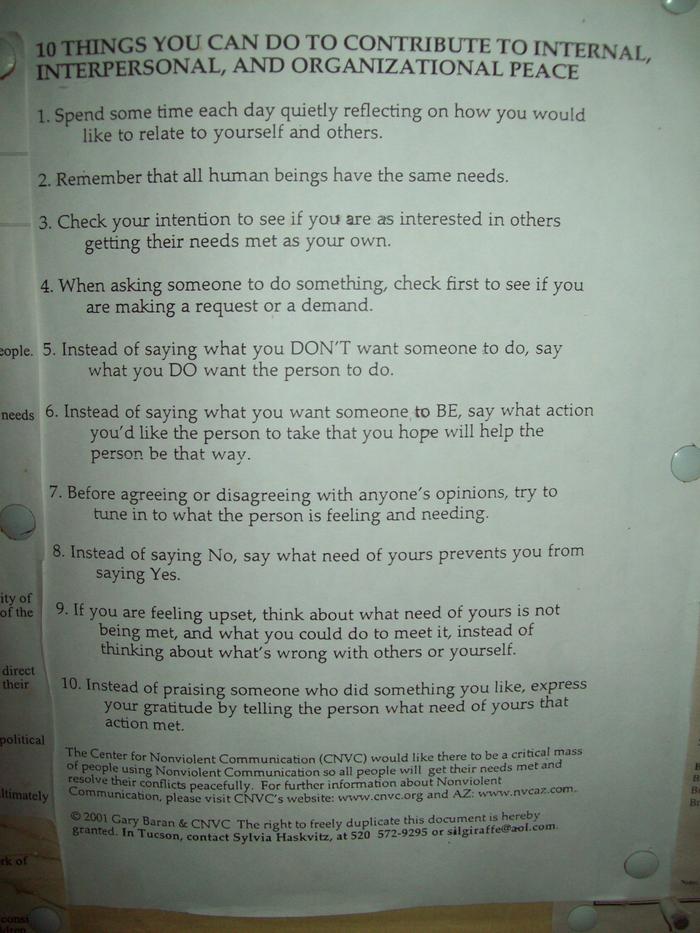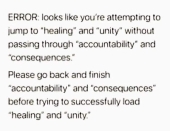
 15
15











 13
13




Gardens in my mind never need water
Castles in the air never have a wet basement
Well made buildings are fractal -- equally intelligent design at every level of detail.
Bright sparks remind others that they too can dance
What I am looking for is looking for me too!

 6
6




 9
9




Pearl Sutton wrote:R Ranson: I agree with part of the problem being English wording. The other half is we were raised with that wording. We were in trouble for spilling the milk because we were horsing around and not paying attention, so we attach the idea of blame to the concept.
Pecan Media: food forestry and forest garden ebooks
Now available: The Native Persimmon (centennial edition)
 7
7




Sometimes the answer is nothing

 4
4




Permies is awesome!!!
 3
3




wayne fajkus wrote:I generally look at the intention.
A person can drop or bump a glass of milk and it falls to the ground. I give that a pass.
A person that threw the glass of milk against a wall doesn't get a pass. It was intentional.
 13
13




 1
1




William Bronson wrote:
wayne fajkus wrote:I generally look at the intention.
A person can drop or bump a glass of milk and it falls to the ground. I give that a pass.
A person that threw the glass of milk against a wall doesn't get a pass. It was intentional.
How do you deal with repeated spilling?
Unwillingness to move the milk out of the way?
Inexplicable refusal to clean up the mess?
I encounter these forms of revealed intention more often.
Sometimes the answer is nothing

 4
4






 4
4











 11
11





"We're all just walking each other home." -Ram Dass
"Be a lamp, or a lifeboat, or a ladder."-Rumi
"It's all one song!" -Neil Young
 1
1




 4
4




 5
5




If one reads Judith Browning's post above, there are definitely many different ways to communicate "responsibility" without assigning blame in such a way as to shift the focus to "how are we going to fix this problem" from "I'm a failure because I screwed up". English is very focused on "blame" and it really hasn't done our civilization much good, IMO. Yes, I agree in your example, that the caretakers need to make that connection and hide the tractor keys - in my mom's case, when I heard she'd badly burned a pot due to her Alzeimers, I asked my sisters if they should consider turning off the breaker to the oven, which is exactly what they did, but it took me asking for them to consider that as the best solution. Blaming mom for the burned pot was a waste of mental and emotional energy - just figure out a reasonable solution to the problem. The words we use in situations, too often focus on the blame rather than the problem solving process - we blame the oil industry for too much CO2 in the atmosphere rather than looking at how to reduce our dependence on it or find uses for that extra CO2. In fact, there's a big difference between "blaming" and "responsibility". The first is not required to get to the second and the second does not always lead from the first. If we wait for the oil industry to clean up the CO2, we'll quite possibly be extinct before they get there. If we use our own ingenuity to sequester carbon in all the farmland in North America that permaculturalists can influence, not to mention every front and back yard, we might make it!It was not my Grandfather's fault that he got Alzheimer's, but it is our responsibility as caretakers to ensure he does not plow his tractor into the side of a car coming up the road either. So we do have to assign blame, we do have to ensure responsibility, we do have to hide the keys to the tractor...
Visit Redhawk's soil series: https://permies.com/wiki/redhawk-soil
How permies.com works: https://permies.com/wiki/34193/permies-works-links-threads
 3
3




Travis Johnson wrote:But we have to assign blame as society, we have to hold people accountable for their actions..
It was not my Grandfather's fault that he got Alzheimer's, but it is our responsibility as caretakers to ensure he does not plow his tractor into the side of a car coming up the road either. So we do have to assign blame, we do have to ensure responsibility, we do have to hide the keys to the tractor...







 10
10




Gardens in my mind never need water
Castles in the air never have a wet basement
Well made buildings are fractal -- equally intelligent design at every level of detail.
Bright sparks remind others that they too can dance
What I am looking for is looking for me too!

 2
2




 5
5





"We're all just walking each other home." -Ram Dass
"Be a lamp, or a lifeboat, or a ladder."-Rumi
"It's all one song!" -Neil Young
 4
4




 5
5




Buddhist teachings suggest........that we are looking for the wrong type of truth. The debate around this incident has focused primarily on the question “Who is to blame?” or “Who is the villain of this story?” The Buddha, however, was known to point out that the question we should be asking is “What are the conditions that led to this situation?”
"We're all just walking each other home." -Ram Dass
"Be a lamp, or a lifeboat, or a ladder."-Rumi
"It's all one song!" -Neil Young
 2
2




Travis you found a work around. There are places for that and you were humble enough, or had broad enough shoulders to carry the load, that you were prepared to use what worked. It doesn't/didn't fix the underlying problem, or teach people what Judith Browning quoted from Buddha - "what are the conditions that led to this"? I can see that on a railroad, knowing what led to a problem would be of great interest to me, so long as it then led to responsible problem solving and improvement *before* a deadly accident.When I was in upper management on the railroad, we would have these stupid meeting where we would go around, and around, and around the table until I noticed a pattern. When someone finally accepted blame for the problem, suddenly the meeting moved in a forward, productive way again. There was no consequence to it, everyone just expected problems, they just did not want to be the one that accepted it.
Visit Redhawk's soil series: https://permies.com/wiki/redhawk-soil
How permies.com works: https://permies.com/wiki/34193/permies-works-links-threads
 5
5




“Action on behalf of life transforms. Because the relationship between self and the world is reciprocal, it is not a question of first getting enlightened or saved and then acting. As we work to heal the earth, the earth heals us.” ~ Robin Wall Kimmerer
 4
4




“The most important decision we make is whether we believe we live in a friendly or hostile universe.”― Albert Einstein
 3
3




r ranson wrote:What I was hoping we could talk about is how NOT to assign blame.
Not when or how to assign blame.

'Every time I learn something new, it pushes some old stuff out of my brain.'
 5
5




F Agricola wrote:So, somewhat ironically, if you seek to apportion blame it usually means wearing some of the responsibility yourself.
 3
3




 1
1




 2
2











 4
4




“We can complain because rose bushes have thorns, or rejoice because thorn bushes have roses.” — Abraham Lincoln
 3
3




I find it interesting that you found the same "solution" as Travis Johnson to keep a situation moving past the "blame stage" towards problem solving. So what words can we come up with to get past "blame" without taking the blame onto ourselves when sooo... many people around us are conditioned to that "blame before you fix" approach?I just automatically assume responsibility for the bad, and never accept credit for the good. That way time isn't spent assigning the blame instead of finding a resolution.
Wording it differently gets the brain out of it's habitual rut so there is more chance of clear communication.
Visit Redhawk's soil series: https://permies.com/wiki/redhawk-soil
How permies.com works: https://permies.com/wiki/34193/permies-works-links-threads




 5
5




 6
6




Laurie Meyerpeter wrote:It's scary because we feel helpless.
Gardens in my mind never need water
Castles in the air never have a wet basement
Well made buildings are fractal -- equally intelligent design at every level of detail.
Bright sparks remind others that they too can dance
What I am looking for is looking for me too!

 4
4




 3
3








James Whitelaw wrote:I guess I have some confusion as “spilt milk”. To me the saying was always “Don’t cry over spilt milk”, never about blame or why there was milk spilt.
 2
2





|
Why should I lose weight? They make bigger overalls. And they sure don't make overalls for tiny ads:
Learn Permaculture through a little hard work
https://wheaton-labs.com/bootcamp
|





